While the Ruby Valley is a region of scenic beauty, it owes much of its charm to the cohabitation of humans with other species and their environment. The valley is populated by more animals than people, and the flora is free to roam the natural areas.
If we share with other species a common origin, if we are infinitely varied products of the evolution of living things, then, while marveling at our own eminent qualities, we can only appreciate those of other species and strive to live with as little harm as possible.
Matthieu Ricard, Advocacy for animals

A land of life where people, fauna and flora cohabit
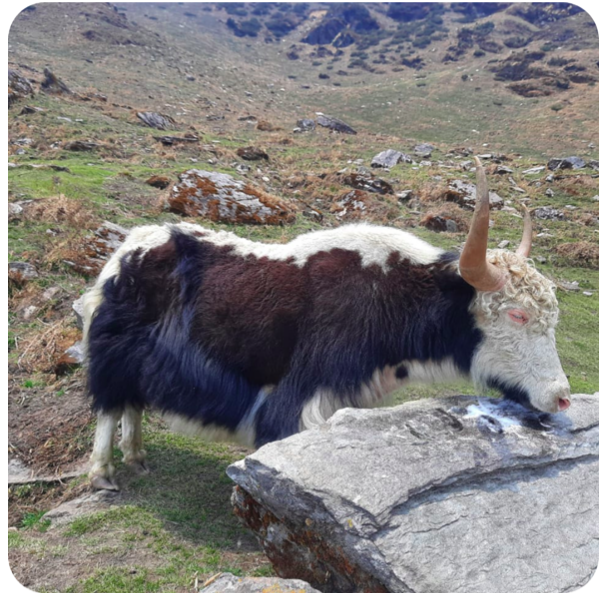
The Ruby Valley is unique because of the harmony between all the beings that inhabit it. The fauna occupying these spaces is mostly composed of hoofed mammals such as yaks, oxen, cows, sheep and mules. They play an important role in human activities and living space. The regularly nomadic population is indeed dependent on their presence for daily chores, travel and subsistence farming. A sensitive and reciprocal link is forged between humans and animals who share the same land.
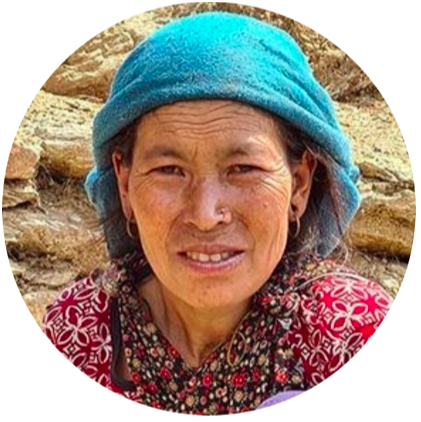
Maruni lives a nomadic life. For 10 months, she travels with her hundred or so sheep, goats and cows, from the highlands to the lowlands, depending on the season. She tells us : “I have a hard life, I live in sheds in remote areas raising my animals. My animals are my friends, my family and my only source of income. I sell their wool and the fertilizer from their waste. With this income I am able to help my children.”
At a time when humanity is consuming the resources in less time than the planet can regenerate in a year, the inhabitants of the Ruby Valley, an economically and geographically isolated region, are living at odds with urban societies that produce and consume more than they can handle. Indeed, the locals meet their needs solely through the subsistence agriculture developed in the valley. No imports are made and the inhabitants only draw on the necessary resources. Thanks to a minimalist way of life and a moderate and conscious management of the land, the community is self-sufficient and evolves in the respect of its natural environment.
However, this isolation also has negative aspects. The villagers are regularly confronted with hazardous and extreme conditions in this mountainous terrain and do not have sufficient access to health care. Their animals are also challenged when snow covers their main food source and they become weak despite farmers doing their best to help them get through the winter.
Karuna’s support for better community development
To support the self-sufficiency of the communities in the Ruby Valley, Karuna is developing a sustainable agriculture program. Traditionally, only few vegetables are grown in the region because of its climate and the methods used.
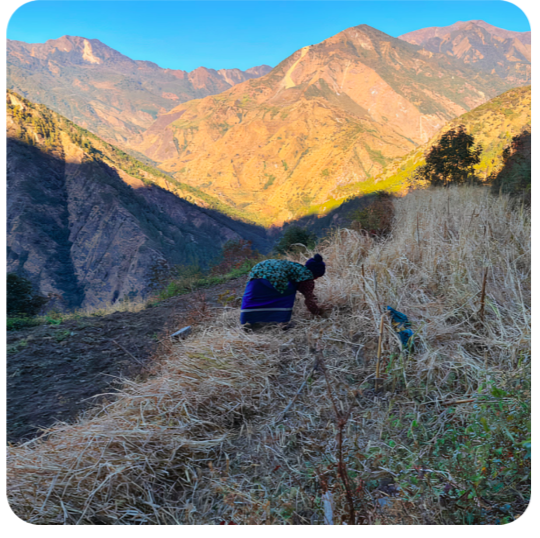
The agricultural program focused mainly on building the capacity of 144 local farmers in vegetable gardening. They received a two-day training on vegetable gardening, focusing on both theory and practice. Initially, a nursery was set up to grow seedlings of different vegetables such as chili, cucumber, pumpkin, bottle gourd, bitter gourd, tomato, crested gourd, coriander etc. After the training, the seedlings were distributed to 233 farmers.
These food crops are important sources of food for the population. They ensure a reciprocal link between the natural productions of the land and the people who grow them. With Karuna’s help, communities can continue to develop and gain access to better nutrition without giving up their independence.
Mrs Tamang, a mother of two children, and her husband earn their livelihood by farming.. She had planned to set up a vegetable garden so that they can enjoy healthy and diverse food. After some training by Karuna staff , she said :
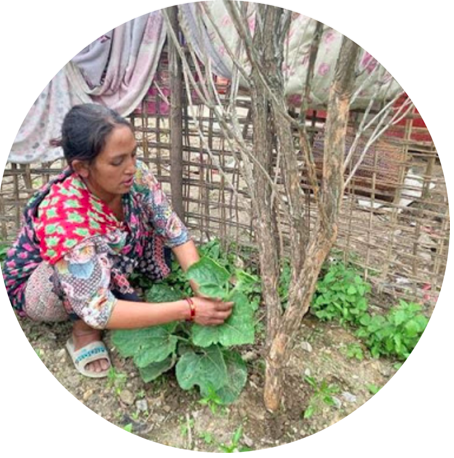
I received several vegetable plants to put in my vegetable garden , which I planted according to the training I had received from Karuna Sechen. Before that I didn’t know how to grow cucumbers and the plants were always dying. Now I know when and how to use the fertilizer to get the soil good before I plant vegetables.
Towards empowerment in both human and animal health management
Improving living conditions also involves access to health care. Karuna’s program also provides medical care and training to villagers, the goal is to help to keep an autonomy considering humans as well as animals’ health. Therefore laboratories and health centers have been opened, and veterinarians intervene to respond to animal needs.
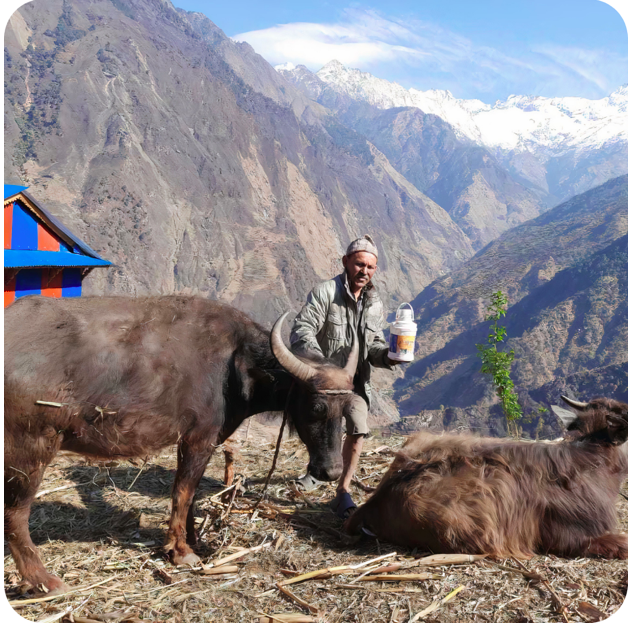
The veterinary programme consists of several steps. Firstly, Karuna brings the medicines, vitamins and dewormers. Then the products are transported by mules up the mountain to be distributed to as many farmers as possible in the Ruby Valley. Finally, the animals are cared for and the farmers are given training in the correct practices to adopt. To date, Karuna has given vitamins and deworming medication to 12,472 animals from 663 different families.
Maruni testifies to the positive effect of the care on her animals : “Thanks to Karuna-Shechen, I was able to get multivitamins for my ewes and pregnant cows. In winter, the animals don’t have enough grass to eat and they get weak, especially pregnant animals, so the multi-vitamins will make them stronger.”
This has an impact not only on the health of the animals but also on the health of the humans who consume some of their produce. Dhana B.K., 55, lives in Tipling, Ruby Valley, with his wife and daughter. A farmer by profession, he also owns four buffaloes so every day he works on the farm and looks after the animals. Like the other farmers in the village, he has received the veterinary medicines distributed by Karuna-Shechen.
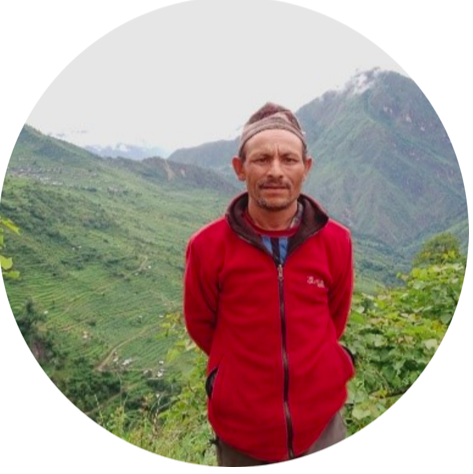
Before giving these medicines, the milk was just enough for the calves. The dewormer and multivitamins have not only increased their appetite, but they are also giving more milk.
Karuna’s new programs in the Ruby Valley aim to protect nature and the vulnerable populations that inhabit this rugged environment. Through a holistic approach, our teams aim to provide a better standard of living while allowing communities to maintain their independence and respect for the land.
With the Covid health crisis, health needs and daily obstacles have increased.
Support this initiative. Together, we make a difference
